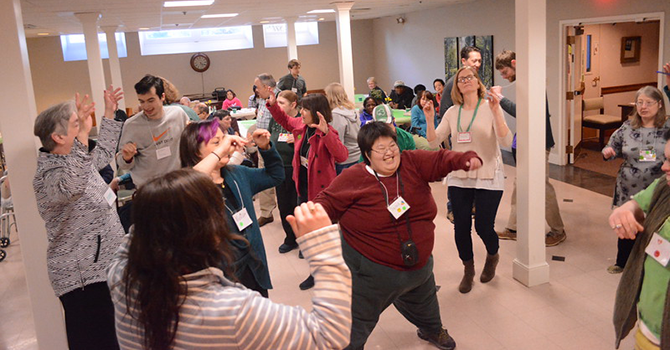Our church had a problem: One of our congregants couldn’t serve communion.
She is one of our spiritual leaders. She is especially wise when it comes to the importance of communion. She knows how much it matters to share a holy meal together, how much it matters that no one is left out.
She can’t tell us that in words. Instead, she lets us know through the agitated movements and sounds she makes when she’s worried that no one is going to serve her. She lets us know in the amazing smiles and squeals she makes after she receives the tiny piece of bread dipped in juice that she can safely swallow. The joy she finds in communion is contagious.
But there was no way to get her wheelchair up the eight steps to the platform where our communion table stood. There was no way to get our monumental communion table down the eight steps to the floor. There wasn’t even a good way to install a mechanical lift, given the architecture of our sanctuary, originally built in 1891.
Our church had a problem: Our congregant couldn’t serve communion. Or light the candles. Or bring up the offering. A lot of other people couldn’t do those things, either. We knew that something had to change.
Who belongs in a church, or in any Christian institution? Who should be welcomed by our spaces and our practices? Who should be empowered to lead? Surely Jesus would not limit his welcome to those who are able-bodied or neurotypical. This is a lesson we have been trying to learn for many years at West Concord Union Church, where I have been serving as pastor since 2009.
The fact that this particular person is part of our congregation is a little bit of a miracle. The story starts in the 1970s, with the movement to deinstitutionalize folks with disabilities. Suddenly, people who had automatically been sent to nursing homes and mental health institutions were given another choice: supported community living.
A new housing program was launched in our town thanks to the work of an organization called Minute Man Arc. Soon, our church had new neighbors in several houses within walking distance. Church leaders welcomed these neighbors into worship. They also formed a new ministry called Sunday Fellowship that was designed to meet the needs and desires of adults with developmental disabilities.
As the ministry began in 1982, lay leader John Danner wrote: “Every person has spiritual needs and questions, and yet too often [those who are developmentally disabled] have been treated as if they had no such feelings. … We here at West Concord Union Church are hoping to alleviate that situation.”
Sunday Fellowship began as a small informal gathering. Over the years, it has offered Christian education, fellowship activities and worship. Sometimes it has been led by staff, other times by lay leaders.
In every era, it has been characterized by a spirit of celebration. There have been dances and picnics, pageants and parties and musicals. Folks at Sunday Fellowship always know how to have fun.
When I arrived as pastor in 2009, Sunday Fellowship had a worship service twice a month in our basement fellowship hall. The lay leaders were both devoted and exhausted. As time went on, more and more folks began to advocate for dedicated staff support. In 2013, we hired the Rev. Melissa Tustin, an ordained Methodist elder who had been on parental leave.
Melissa has brought wonderful changes to Sunday Fellowship. Now, in addition to hymn and church camp song favorites, the Sunday Fellowship musicians accept popular music requests like “You Raise Me Up.” Melissa has reached out beyond our immediate neighborhood to bring in folks from Minute Man Arc houses that are farther away.
Melissa also brings our community the gift of holy impatience. Why shouldn’t the folks from Sunday Fellowship be as fully accepted and integrated in our Sunday morning worship as they are on Sunday afternoons?
This was a hard question for us to face, because we thought we had been accepting. Sure, a few folks had been so uncomfortable with the presence of people with disabilities that they had left the church back in the 1980s. Sure, we still sometimes struggled to know what to do with unpredictable vocalizations or unpredictable actions -- like the time a congregant handed me a dollar bill for the offering right over the flame of a candle, right in the middle of communion.
Still, we knew and loved the folks with disabilities who worshipped with us on Sunday mornings. We had even found ways to include them in ushering, in Advent candle lighting, in our Epiphany pageant. What more was there to do?
There was a lot more to do. From 2012 to 2018, the congregation planned and carried out a major renovation. This renovation began with a need to address structural concerns like our aging roof and our peeling exterior paint. A desire to lessen our environmental impact led to new windows and doors and an array of solar panels. We also prioritized accessibility, including a new entryway that everyone could use and a fully accessible sanctuary.
The renovation cost us a lot: $1.3 million, many difficult conversations, and grief over the removal of most of our pews. We’re now adjusting to our renewed space, and the work goes on.
We’re learning to view those with disabilities among us as teachers with a unique grasp of the gospel. We’re learning that all of us need different accommodations to participate fully in community life. We’re learning to be more and more honest about each other’s gifts and challenges, decentering a false ideal that none of us can live up to anyway.
This fall, we added new tools for worship, including noise-canceling headphones (for those who are sensitive to loud sounds) and visual communication guides (for those who are nonverbal). We’re also trying to communicate more about how our differing needs and preferences can conflict with one another.
Some folks crave silence, while others need to make noise. Some folks are celebrating our sanctuary’s full accessibility, while others are struggling because they can’t see what’s going on up front now that the platform with all those steps has been taken down.
When I interviewed for the role as pastor here, members of the search committee described the community as “scrappy.” I hope that even if our building is a bit more cleaned up now, our congregation is showing more and more of its rough edges.
Church should be a place where we don’t have to hide the things that make us who we are: capacities and limitations; inclinations and identities; griefs, illnesses, addictions and joys.
Now we have a ramp that allows anyone who uses a wheelchair to roll right up to the table, and a table that can move to wherever we need it to be. Change is hard, but what’s most important is being together: at the table, in the sanctuary and as followers of Jesus.














